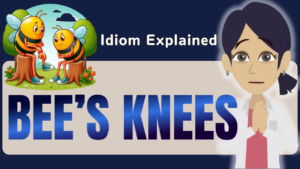Ever heard information so reliable it supposedly came straight from a horse? Let’s unpack this curious idiom!
Information received directly from the most authoritative or reliable source.

The first time I heard this idiom, I pictured a talking horse! This amusing confusion taught me an important lesson.
Understanding “from the horse’s mouth” will enhance your language fluency and cultural comprehension. Join me as we explore its meaning, origins, and practical usage.
Key Takeaways
- You’ll learn what “from the horse’s mouth” really means and why it’s significant.
- You’ll see how idioms can elevate your everyday communication and sharpen your grasp of English.
- You’ll gain practical examples for using this idiom naturally and confidently.
Meaning & Origin
A Humorous Anecdote
When I first encountered the phrase “from the horse’s mouth,” I was at a get-together. Someone announced, “I heard from the horse’s mouth that our friend got a big promotion.”
Jokingly, I asked if the horse in question happened to be in the room. The confused looks around me made it clear I had misunderstood.
That lighthearted blunder prompted me to research the idiom and realize that it symbolizes hearing something directly from the person who truly knows the facts.
Crystal-Clear Definition
- The idiom “from the horse’s mouth” means obtaining information directly from a trustworthy source—often someone with firsthand knowledge.
- This phrase highlights the importance of hearing facts straight from the individual or entity most involved, ensuring greater accuracy.
Practical Examples
- Workplace Scenario
Your manager says, “I heard from the horse’s mouth that we’re finally getting those budget approvals.” In context, the manager received the information directly from the top executive, making it much more credible than any office rumor. - Social Gathering
Suppose a friend tells you, “I got it from the horse’s mouth that the restaurant will close by the end of the year.” If you’re unfamiliar with this idiom, you might picture a talking horse. Yet in reality, the friend likely heard the news directly from the restaurant owner or staff. - Personal Life
If someone says, “I heard from the horse’s mouth that your colleague is moving abroad,” they’re indicating they got the news straight from the colleague or a close connection.
Origin of the Idiom
- This expression originated in the world of horse racing. Bettors often sought insider tips from trainers or owners—people who knew the horse’s condition best.
- The phrase underscores how direct information (e.g., about a horse’s fitness) can be more reliable than gossip or speculation.
Understanding the idiom’s background can be especially useful when you need to emphasize that what you’re saying is factual and verified.
The next time you want to show you have firsthand confirmation, remember “from the horse’s mouth” is both vivid and authentic.
Visual Trick: “Horse’s Mouth”
Visualizing the Idiom Clearly
One way to remember “from the horse’s mouth” is to imagine a horse quietly relaying confidential details directly to you.
The horse symbolizes the most authentic source, while the whispered secret represents crucial, reliable knowledge. This mental image is often humorous yet surprisingly effective as a memorization tool.
How to Use Memory Techniques
- Picture a horse gently leaning in to share something important.
- Recognize that you’re receiving the scoop straight from the origin—not from rumors or secondhand chatter.
Each time you recall this scene, you’ll reinforce the notion that the idiom conveys accuracy and directness.
Use & Examples
Incorporating idioms into your English conversations can add character and depth. “From the horse’s mouth” is particularly useful when you want to stress authenticity and reliability. Below are some illustrative examples:
Practical Example Sentences
- “I heard from the horse’s mouth that the company is restructuring, and the CEO will announce it soon.”
- Emphasizes that the speaker received inside information from someone with authority.
- Emphasizes that the speaker received inside information from someone with authority.
- “She told me, from the horse’s mouth, that our flight might be canceled due to maintenance issues.”
- Indicates the news came directly from the airline representative, not just an online rumor.
- Indicates the news came directly from the airline representative, not just an online rumor.
- “You can trust this. I got it straight from the horse’s mouth.”
- Highlights that the speaker genuinely trusts the source’s credibility.
- Highlights that the speaker genuinely trusts the source’s credibility.
- “My friend joked about talking to animals when I said I heard from the horse’s mouth, until I explained the phrase.”
- Shows how literal interpretations of idioms can prompt funny misunderstandings.
- Shows how literal interpretations of idioms can prompt funny misunderstandings.
- “A colleague gave me the update from the horse’s mouth, so I’m confident about the new deadline.”
- Underlines direct, verified information, eliminating guesswork.
Everyday Contextual Usage
Using “from the horse’s mouth” demonstrates that you’re relaying details confirmed by an individual or group deeply involved. This can be especially important:
- At work, if you want to show your sources are credible.
- In personal situations, if you want to convey trustworthy news.
By using idioms effectively, you not only improve your fluency but also connect with listeners on a more engaging level.
History & Modern Examples
The phrase “from the horse’s mouth” has an interesting history that continues to influence its use today.
- Historical Background
- Originates from horse racing.
- Refers to obtaining crucial knowledge about a horse’s performance directly from those closest to it (e.g., owners or trainers).
- Modern Examples
- Everyday Conversation: “I heard from the horse’s mouth that the concert is already sold out.”
- Journalistic Context: “The reporter got the details from the horse’s mouth, meaning from an insider involved in the story.”
- Personal Preference: “I don’t trust random gossip. I want to hear it from the horse’s mouth.”
Even in modern settings, the idiom remains a clear way to highlight direct and credible information.
Rephrasing Without Idiom
Sometimes, clarity is more important than style—especially in formal contexts or when speaking with those unfamiliar with idiomatic language.
Here’s how you can convey the same meaning without saying “from the horse’s mouth.”
Rephrasing the Sentence
Take the example: “I heard from the horse’s mouth that the company is going bankrupt.”
- Direct Source Confirmation
“I received the information directly from the CEO that the company is going bankrupt.”- This rephrase pinpoints the authority figure and confirms where the news came from.
- This rephrase pinpoints the authority figure and confirms where the news came from.
- Confirmation by Authority
“The CEO confirmed the bankruptcy, so there’s no doubt.”- Emphasizes that an individual with clear knowledge validated the information.
Alternative Expressions
- Straight from the source: Conveys that your knowledge comes from the original origin.
- Verified by someone in charge: Indicates a person with authority validated your details.
Both expressions maintain the notion of authenticity without using the idiom itself.
Real-Life Story
Nothing illustrates an idiom better than a genuine situation. Consider this story:
- Scenario: A friend was searching for a used car.
- Concern: She wondered if the vehicle had ever been in an accident.
- Dealer’s Word: The dealership insisted it was accident-free.
- Desire for Certainty: She wanted to hear it from the horse’s mouth—directly from the previous owner.
- Verification: The previous owner revealed the car had indeed been in a collision.
- Result: She opted not to finalize the purchase.
This underscores why direct, reliable information is so vital. Trusting only secondhand statements can lead to costly mistakes.
When you need to verify crucial details, going straight to the source can save time and prevent misunderstandings.
Similar & Opposite
Having a broader understanding of expressions related to “from the horse’s mouth” can help you fine-tune your communication.
Similar Expressions
- Straight from the horse’s mouth
- Emphasizes the same idea of firsthand information.
- From the source
- Suggests direct contact with the origin of the information.
- From the top
- Implies guidance or news from the highest authority.
Opposite Expressions
- Secondhand information
- Indicates details passed along through intermediaries.
- Hearsay
- Refers to rumors not confirmed by the principal party.
- Gossip
- Casual talk that often lacks solid verification.
Using these expressions strategically can strengthen how you convey reliability or clarify when news is less certain.
Related Idioms
Sometimes, learning one idiom opens doors to others with a related theme. Here are a few phrases involving horses that can add character to your speech:
- Don’t Look a Gift Horse in the Mouth
- Explanation: Advises against questioning the value of a gift or favor.
- Example: If someone gives you a complimentary ticket, be thankful and don’t complain about the seat location.
- Beat a Dead Horse
- Explanation: Tells you not to waste time reviving a topic or issue that’s already settled.
- Example: If an agreement has already been reached, there’s no point in continuing the argument.
- Hold Your Horses
- Explanation: Encourages patience or waiting before taking action.
- Example: If you feel tempted to respond immediately to a heated message, remember to hold your horses and think first.
Although each phrase differs in meaning, the horse theme links them, and they can make conversations more lively and memorable.
Pop Quiz: Check Your Idiom Skills
From the Horse’s Mouth

Conclusion
“From the horse’s mouth” is an expression that underscores the value of trustworthy, firsthand information.
Whether you’re discussing workplace updates, personal news, or important decisions, this idiom can reinforce your credibility by indicating that you have the most direct source possible.
Final Key Points
- Meaning: This idiom signifies hearing details from the individual best positioned to know the truth.
- Origin: It stems from horse racing, where trainers or owners offered inside knowledge.
- Usage: Employing this phrase underscores accuracy and authenticity, whether in casual conversation or professional settings.
Embrace this idiom when you need to prove your facts are genuine and avoid misconceptions. If you remember to envision a horse quietly sharing a secret, the phrase will be hard to forget.



Whenever you use it, you’ll highlight that your information is not just hearsay—it’s verified at the source.









Comment